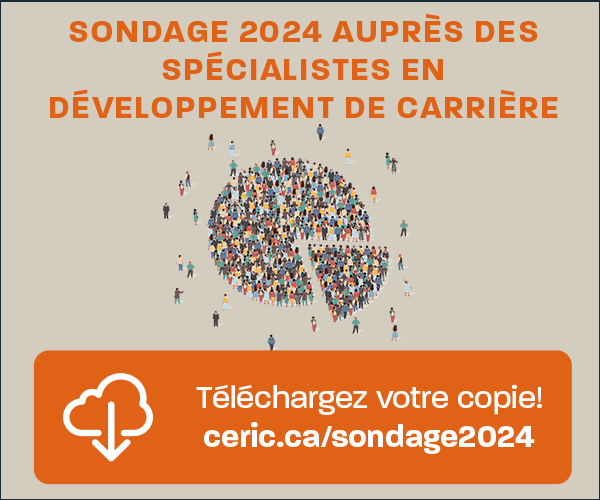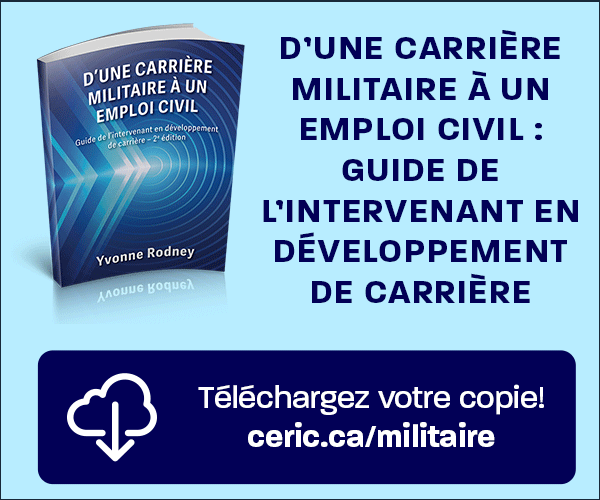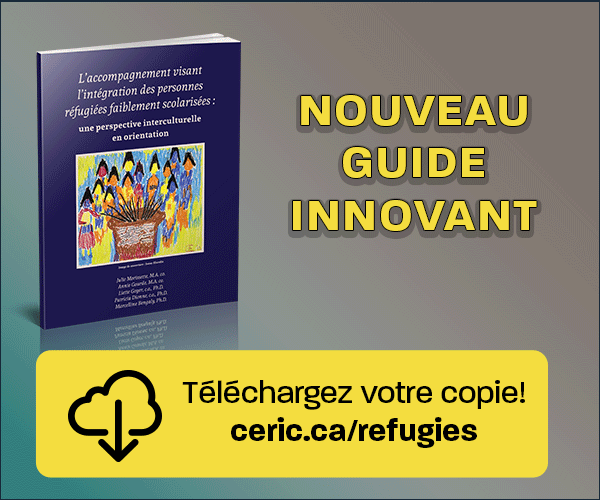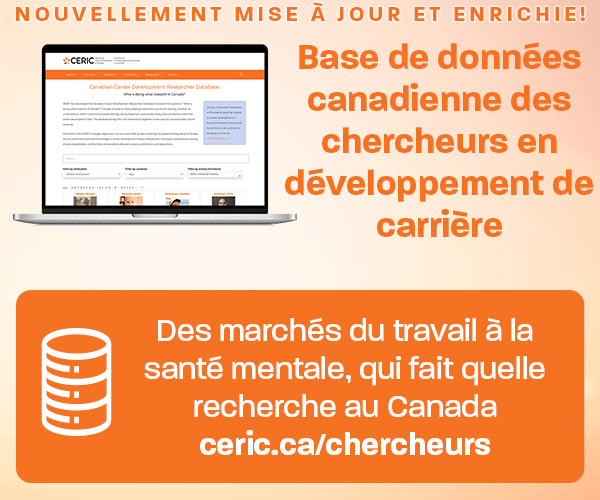Pratiques de développement de carrière : Ce que les théories et les modèles ont à offrir
DOI :
https://doi.org/10.53379/cjcd.2025.431Mots-clés :
la théorie du développement de carrière, praticiens de carrière, Développement de carrière, modèles de développement de carrière, la pratique du développement de carrièreRésumé
La théorie de la carrière sert de fondement essentiel à la pratique, mais sa pertinence est parfois remise en question en raison d'un décalage perçu entre la théorie et son application pratique. Nous soutenons que l'utilité pratique de la théorie devrait être un critère central dans l'évaluation des théories et modèles de carrière contemporains. Cette étude visait à combler le fossé entre la théorie et la pratique en analysant les applications pratiques de 43 théories et modèles de carrière présentés dans Career Theories and Models at Work : Ideas for Practice (Arthur et al., 2019). L'analyse thématique a permis de dégager huit thèmes fondamentaux qui soutiennent la pratique axée sur la théorie. Nous soutenons que, quelle que soit leur orientation théorique, les professionnels de la carrière peuvent tirer profit de la compréhension et de l'application de ces thèmes. Les résultats sont discutés en mettant l'accent sur l'accessibilité des théories et des modèles de carrière en vue de leur intégration dans la pratique. Des points de pratique développés par les auteurs des chapitres sont fournis, illustrant comment des théories et des modèles spécifiques ont éclairé les huit thèmes. Des suggestions sont faites pour aligner les thèmes sur les normes et lignes directrices professionnelles, et pour améliorer l'apprentissage et la supervision.
Références
Amundson, N. (2019). Active engagement: Answering the call for imagination. In N. Arthur, R. Neault, & M. McMahon (Eds.), Career theories and models at work: Ideas for practice (pp. 1-9). CERIC.
Aravind, S., & Arulmani, G. (2019). Understanding the career development of children with dyslexia: The cultural preparation process model of career development. In N. Arthur, R. Neault, & M. McMahon (Eds.), Career theories and models at work: Ideas for Practice (pp. 11-19). CERIC.
Arthur, N. (2019). Culture-infused career counselling: Connecting culture and social justice in career practices. In N. Arthur, R. Neault, & M. McMahon (Eds.), Career theories and models at work: Ideas for Practice (pp. 21-30). CERIC.
Arthur, N. (2024). Culture-infused career counselling: Exploring narratives for context and social justice. In M. McMahon & P. Abkhezr (Eds.), The practice and theory of career construction (pp. 166-176). Routledge.
Arthur, N., Borgen, R., & McMahon, M. (Eds.). (2024). Practice principles: Career theories and models at work. CERIC.
Arthur, N., Neault, R., & McMahon, M. (Eds.). (2019). Career theories and models at work: Ideas for practice. CERIC.
Arthur, N., & McMahon, M. (2019). Contemporary theories of career development: International perspectives. Routledge.
Arulmani, G. (2024). Contexts and circumstances: The cultural preparedness approach to career development. In M. McMahon & P. Abkhezr (Eds.), The practice and theory of career construction (177-190). Routledge.
Bakshi, A., & Fialho, N. (2019). Life course theory: Ideas for career counsellors. In N. Arthur, R. Neault, & M. McMahon (Eds.), Career theories and models at work: Ideas for Practice (pp. 31-40). CERIC.
Bassot, B. (2016). The reflective practice guide: An interdisciplinary approach to critical reflection. Routledge.
Bernes, K. (2019). Implementing the synergistic theory of organizational career development. In N. Arthur, R. Neault, & M. McMahon (Eds.), Career theories and models at work: Ideas for practice (pp. 41-52). CERIC.
Bimrose, J. (2019). Sociological career theory: Reframing choice. In N. Arthur, R. Neault, & M. McMahon (Eds.), Career theories and models at work: Ideas for practice (pp. 53-62). CERIC.
Blustein, D., Duffy, R., Erby, W., & Kim, H. (2019). The psychology of working theory: A transformative approach to work and career. In N. Arthur, R. Neault, & M. McMahon (Eds.), Career theories and models at work: Ideas for practice (pp. 63-72). CERIC.
Braun, V., & Clarke, V. (2006). Using thematic analysis in psychology. Qualitative Research in Psychology, 3, 77-101. https://doi.org/10.1191/1478088706qp063oa
Braun, V., & Clarke, V. (2019) Reflecting on reflexive thematic analysis: Qualitative Research in Sport, Exercise and Health, 11(4), 589-597. https://doi.org/10.1080/2159676X.2019.1628806
Braun, V., & Clarke, V. (2021). Thematic analysis: A practical guide. Sage.
Brott, P. E. (2019). Narrative career counselling: the storied approach. In N. Arthur & M. McMahon (Eds.), Career theories and models at work: Ideas for practice (pp. 73-82). CERIC.
Brown, D. (2002). Introduction to theories of career choice and development. In D. Brown & Associates (Ed.), Career choice and development (4th ed., pp. 3–23). Jossey Bass.
Canadian Career Development Foundation. (2021). Pan-Canadian competency framework for career development professionals: Summary of competencies. Canadian Career Development Foundation. https://cdpc-cedc.ca/wp-content/uploads/Competency_Framework-Summary_of_Competencies.pdf
Career Industry Council of Australia. (2022). Professional Standards for Australian Career Development Practitioners. https://cica.org.au/wp-content/uploads/CICA-Professional-Standards-2.1-Final-2022-2.pdf
Challenge Factory (2024). Hidden sector, hidden talent: Mapping Canada’s career development sector. https://ceric.ca/publications/hidden-sector-hidden-talent-mapping-canadas-career-development-sector/
Chen, C. P., & Hong, J. W. L. (2019). Career self-determination theory in practice. In N. Arthur, R. Neault, & M. McMahon (Eds.), Career theories and models at work: Ideas for practice (pp. 83-92). CERIC.
Cournoyer, L., & LaChance, L. (2019). Decision-action model: Overview and application to career development. In N. Arthur, R. Neault, & M. McMahon (Eds.), Career theories and models at work: Ideas for Practice (pp. 93-102). CERIC.
Dionne, P., & Dupuis, A. (2019). Cultural-historical activity theory: Group career counselling for social justice of racialized women. In N. Arthur, R. Neault, & M. McMahon (Eds.), Career theories and models at work: Ideas for practice (pp. 103-114). CERIC.
Domene, J. F., & Young, R. A. (2019). Career counselling using contextual action theory: Key concepts for practice. In N. Arthur, R. Neault, & M. McMahon (Eds.), Career theories and models at work: Ideas for Practice (pp. 115-124). CERIC.
Godden, L., & Borgen, R. A. (2024). Professionalizing the Canadian career development sector: A retrospective analysis. Canadian Journal of Career Development, 23(1), 34-47. https://doi.org/10.53379/cjcd.2024.385.
Goodman, J. (2019). Schlossberg’s 4S model of life transitions: Assessment and intervention planning. In N. Arthur, R. Neault, & M. McMahon (Eds.), Career theories and models at work: Ideas for practice (pp. 125-134). CERIC.
Goyer, L., & Dumas, M. (2019). My career GPS: A self-orienting career model for people and organizations. In N. Arthur, R. Neault, & M. McMahon (Eds.), Career theories and models at work: Ideas for practice (pp. 135-146). CERIC.
Government of Canada. (n.d.). Learn about the skills. https://www.canada.ca/en/services/jobs/training/initiatives/skills-success/understanding-individuals.html
Hartung, P. J., & Santilli, S. (2024). The practice and theory of career construction. In M. McMahon & P. Abkhezr (Eds.), Narrative career counselling: From theory to practice in diverse cultures and contexts (pp. 94-103). Routledge.
Healy, M., & McIlveen, P. (2019). My career chapter: The dialogical self as author and editor of a career autobiography. In N. Arthur, R. Neault, & M. McMahon (Eds.), Career theories and models at work: Ideas for practice (pp. 147-158). CERIC.
Howard, K. A. S., & Dinius, S. M. (2019). Children’s reasoning about career development: The conceptions of career choice and attainment model. In N. Arthur, R. Neault, & M. McMahon (Eds.), Career theories and models at work: Ideas for practice (pp. 159-170). CERIC.
International Association for Educational and Vocational Guidance. (2018). International competencies for educational and vocational guidance practitioners. https://iaevg.com/competencies
Irving, B. A. (2021). The positioning of social justice: Critical challenges for career development. In P. J. Robertson, T. Hooley, and P. McCash (Eds.), The Oxford handbook of career development (pp. 181-192). Oxford Academic.
Kattelus, M. (2019). KIPINA: SPARKS career counselling. In N. Arthur, R. Neault, & M. McMahon (Eds.), Career theories and models at work: Ideas for practice (pp. 171-182). CERIC.
Killeen, J. (1996). Career theory. In A.G. Watts, B. Law, J. Killeen, J. Kidd, & R. Hawthorn (Eds.), Rethinking careers education and guidance: Theory, policy and practice (pp. 23-45). Routledge.
Kolb, D. A. (1984). Experiential learning: Experience as the source of learning and development. Prentice Hall.
Krumboltz, J. D. (1994). Improving career development from a social learning perspective. In M. L. Savickas & R. W. Lent (Eds.), Convergence in career development theories (pp. 9-32). CPP Books.
Krumboltz, J. (1996). A learning theory of career counseling. In M. Savickas & W. Walsh (Eds.), Handbook of career counseling theory and practice (pp. 55-81). Davies-Black.
Lengelle, R., Meijers, F., & Bonnar, C. (2019). Poetic creativity: The career writing method for professional reflectivity in the 21st century. In N. Arthur, R. Neault, & M. McMahon (Eds.), Career theories and models at work: Ideas for practice (pp. 183-194). CERIC.
Lent, R. W. (2017). Integration of theory, research and practice: A social cognitive perspective. In J. P. Sampson Jr., E. Bullock-Yowell, V. C. Dozier, D. S. Osborn, & J. G. Lenz (Eds.), Integrating theory, research and practice in vocational psychology: Current status and future directions (pp. 20-27). Florida State University.
Life Strategies Ltd. (2013). Skill requirements for BC’s career development practitioners: An exploratory study. Report submitted to CfEE. http://www.cfeebc.org/reports/skill-requirements-for-BC-career-development-practitioners.pdf
Lincoln, Y., & Guba, E. G. (1985). Naturalistic inquiry. Sage.
Luken, T., & de Folter, A. (2019). Acceptance and commitment therapy fuels innovation of career counselling. In N. Arthur, R. Neault, & M. McMahon (Eds.), Career theories and models at work: Ideas for practice (pp. 195-206). CERIC.
Magnusson, K. A., & Redekopp, D. E. (2019). Coherent career practice: A framework to organise career development concepts and practices. In N. Arthur, R. Neault, & M. McMahon (Eds.), Career theories and models at work: Ideas for practice (pp. 207-216). CERIC.
Maree, J. G. (2019a). Career construction theory and its application. In N. Arthur & M. McMahon (Eds.), In N. Arthur, R. Neault, & M. McMahon (Eds.), Career theories and models at work: Ideas for practice (pp. 217-226). CERIC.
Maree, J. G. (Ed.). (2019b). Handbook of innovative career counselling. Springer.
Matthews, R. J. (2017). A theory for everything? Is a knowledge of career development theory necessary to understand career decision making? European Scientific Journal, 13, 320-334. https://doi.org/10.19044/esj.2017.v13n7p320
McCoy, L. (2019). Conceptualizing athletic career transitions with the holistic athletic career model. In N. Arthur, R. Neault, & M. McMahon (Eds.), Career theories and models at work: Ideas for practice (pp. 227-236). CERIC.
McMahon, M. (2019). Does career theory matter to the practice of career development? CERIC. https://careerwise.ceric.ca/2019/02/08/does-theory-matter-to-the-practice-of-career-development/#.Y9IjSa1ByUl
McMahon, M., & Abkhezr, P. (2024). Narrative career counselling: From theory to practice in diverse cultures and contexts. Routledge.
McMahon, M., & Arthur, N. (2019). Career development theory: Origins and history. In N. Arthur & M. McMahon (Eds.), Contemporary theories of career development: International perspectives (pp. 3-19). Routledge.
McMahon, M., & Patton, W. (2019). The systems theory framework of career development: Applying systems thinking to career development theory and practice. In N. Arthur, R. Neault, & M. McMahon (Eds.), Career theories and models at work: Ideas for practice (pp. 237-247). CERIC.
McMahon, M., & Patton, W. (2024). A story telling approach to narrative career counselling: Application of the systems theory framework of career development. In M. McMahon & P. Abkhezr (Eds.), Narrative career counselling: From theory to practice in diverse cultures and contexts (pp. 60-72). Routledge.
McWhirter, E. H., & McWha-Hermann, I. (2021). Social justice and career development: Progress, problems, and possibilities. Journal of Vocational Behavior, 126, 1-17. https://doi.org/10.1016/j.jvb.2020.103492
Miller, J. (2019). Solution-focused theory and career practice. In N. Arthur, R. Neault, & M. McMahon (Eds.), Career theories and models at work: Ideas for practice (pp. 249-260). CERIC.
Milot-Lapointe, F., Le Corff, Y., & Arifoulline, N. (2021). A meta-analytic investigation of the association between working alliance and outcomes of individual career counseling. Journal of Career Assessment, 29(3), 486- 501. https://doi.org/10.1177/1069072720985037
Nauta, M. M. (2019). Holland’s theory of career choice: Matching personalities and environments. In N. Arthur, R. Neault, & M. McMahon (Eds.), Career theories and models at work: Ideas for practice (pp. 261-270). CERIC.
Neault, R. A., & Pickerell, D. A. (2019). Career engagement: A conceptual model for aligning challenge and capacity. In N. Arthur & M. McMahon (Eds.), Career theories and models at work: Ideas for practice (pp. 271-282). CERIC.
Neary, S., & Johnson, C. (2016). CPD for the career development professional: A handbook for enhancing practice. Trotman.
Niles, S. G., Amundson, N., & Yoon, H. J. (2019). Hope action theory: Creating and sustaining hope in career development. In N. Arthur, R. Neault, & M. McMahon (Eds.), Career theories and models at work: Ideas for practice (pp. 283-294). CERIC.
Nowell, L. S., Norris, J. M., White, D. E., & Moules, N. J. (2017). Thematic analysis: Striving to meet the trustworthiness criteria. International Journal of Qualitative Methods, 16, 1-13. https://doi.org/10.1177/1609406917733847
Osborn, D. S., Dozier, V. C., Bullock Yowell, E., Hayden, S. C. W., & Sampson, J. P. (2019). Cognitive information processing theory: Applying theory and research to practice. In N. Arthur, R. Neault, & M. McMahon (Eds.), Career theories and models at work: Ideas for practice (pp. 307-316). CERIC.
Patton, W., & McMahon, M. (2021). Career development and systems theory: Connecting theory and practice (4th ed.). Brill.
Picard, F., Turcotte, M., Viviers, S., & Dionne, P. (2019). Career development practices from the capabilities perspective of social justice. In N. Arthur, R. Neault, & M. McMahon (Eds.), Career theories and models at work: Ideas for Practice (pp. 307-316). CERIC.
Poehnell, G. (2019). Hope-filled engagement: New possibilities in life/career counselling. In N. Arthur, R. Neault, & M. McMahon (Eds.), Career theories and models at work: Ideas for practice (pp. 317-326). CERIC.
Popadiuk, N. (2019). Relational-cultural theory: Exploring how relationships influence career development. In N. Arthur, R. Neault, & M. McMahon (Eds.), Career theories and models at work: Ideas for practice (pp. 327-336). CERIC.
Pope, M. (2019). The career counselling with underserved populations model in practice. In N. Arthur, R. Neault, & M. McMahon (Eds.), Career theories and models at work: Ideas for practice (pp. 337-346). CERIC.
Pryor, R. G. L., & Bright, J. E. H. (2019). Chaos theory for career counsellors. In N. Arthur, R. Neault, & M. McMahon (Eds.), Career theories and models at work: Ideas for practice (pp. 347-358). CERIC.
Richardson, M. (2019). Counselling/psychotherapy: Bringing a vocational perspective into psychotherapy practice. In N. Arthur, R. Neault, & M. McMahon (Eds.), Career theories and models at work: Ideas for practice (pp. 359-368). CERIC.
Riverin-Simard, D., & Simard, Y. (2019). The continuous participation model: The ever-evolving perception of work. In N. Arthur, R. Neault, & M. McMahon (Eds.), Career theories and models at work: Ideas for practice (pp. 369-378). CERIC.
Schön, D. A. (1992). The reflective practitioner: How professionals think in action. Basic Books.
Sheu, H-B., & Wang, X. T. (2019). Social cognitive career theory: Overview and practical applications. In N. Arthur, R. Neault, & M. McMahon (Eds.), Career theories and models at work: Ideas for practice (pp. 379-390). CERIC.
Solmonson, L. L., Mullener, W., & Eckstein, D. G. (2009). A thematic perspective to lifespan development. National Social Science Press.
Spangar, T. (2019). Sociodynamic career counselling. In N. Arthur, R. Neault, & M. McMahon (Eds.), Career theories and models at work: Ideas for practice (pp. 391-400). CERIC.
Swanson, J., & Fouad, N. (2019). Career theories and practice: Learning through case studies (4th ed.). Sage.
Tang, M. (2019). Ecological career counselling model: Enhancing accordance of person and environment for a meaningful life. In N. Arthur, R. Neault, & M. McMahon (Eds.), Career theories and models at work: Ideas for practice (pp. 401-410). CERIC.
van Brussel, G. (2019). The space model for intrapreneurship: Facilitating development of a new career role. In N. Arthur, R. Neault, & M. McMahon (Eds.), Career theories and models at work: Ideas for practice (pp. 411-422). CERIC.
Viviers, S. (2019). Taking care of oneself by taking care of one’s work: A clinical and critical perspective on work and mental health. In N. Arthur, R. Neault, & M. McMahon (Eds.), Career theories and models at work: Ideas for practice (pp. 423-432). CERIC.
Vondracek, F., & Ford, H. (2019). The living systems theory of vocational behavior and development. In N. Arthur, R. Neault, & M. McMahon (Eds.), Career theories and models at work: Ideas for practice (pp. 433-442). CERIC.
Watson, M. (2019). The reciprocal relationship of career theory and practice. In N. Arthur & M. McMahon (Eds.), Contemporary theories of career development: International perspectives (pp. 20-30). Routledge.
Watson, M., & Stead, G.B. (2017). And overview of career theory. In G.B. Stead & M.B. Watson (Eds.), Career psychology in the South African context (3rd ed., pp. 21-47). Van Schaik.
Whiston, S. C., Rossier, J., & Barón, P. M. H. (2016). The working alliance in career counseling: A systematic overview. Journal of Career Assessment, 24, 591-604. https://doi.org/10.1177/1069072715615849
Woodend, J. (2019). The theory of work adjustment: Seeking and maintaining satisfaction and satisfactoriness. In N. Arthur, R. Neault, & M. McMahon (Eds.), Career theories and models at work: Ideas for practice (pp. 433-442). CERIC.
Yates, J. (2024). Career development theories in practice: Real-world applications of career development models. Trotman.
Young, R. A. (2024). Career counselling as and about goal directed action. In M. McMahon & P. Abkhezr (Eds.), Narrative career counselling: From theory to practice in diverse cultures and contexts (pp. 104-113). Routledge.
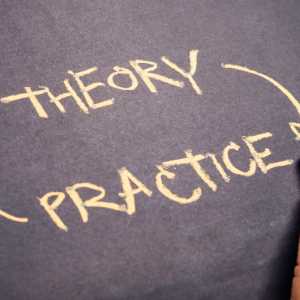
Téléchargements
Publié-e
Comment citer
Numéro
Rubrique
Licence
(c) Tous droits réservés La Revue canadienne de développement de carrière 2025

Cette œuvre est sous licence Creative Commons Attribution - Pas d'Utilisation Commerciale - Pas de Modification 4.0 International.

